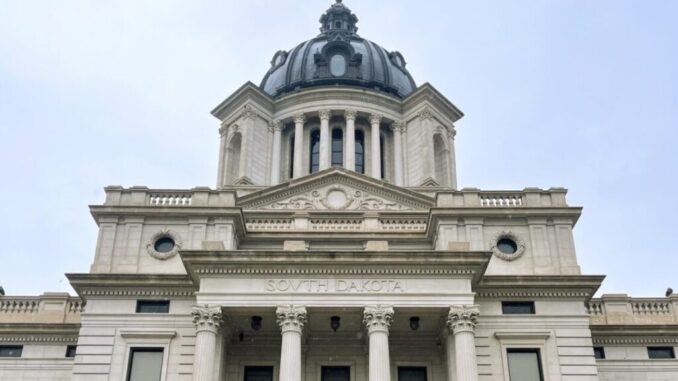
Makenzie Huber/South Dakota Searchlight
Lawmakers on an interim committee studying long-term care in South Dakota plan to bring 12 proposals to the 2024 legislative session.
The proposals are meant to support the long-term care industry as the state’s population ages. Problems in the industry have contributed to the closure of at least 18 nursing homes in South Dakota since 2015.
The committee hopes to incentivize regionalization, expand and increase Medicaid reimbursements for in-home care services, and support more technology use in long term-care facilities, among other recommendations.
Altogether, the price tags on the proposals could add up to an estimate of over $9 million in the first year of implementation — if all bills pass as drafted.
The group will deliver a report to the legislative Executive Board in November. If approved, the Legislative Research Council will move forward with bill drafts.
The proposals, picked from a list of 22 original recommendations, are:
- Establishing a one-time $5 million technology grant program.
- Expanding Medicaid reimbursement to palliative care.
- Increasing the personal needs allowance for Medicaid recipients.
- Creating a reimbursement program to incentivize nursing homes mergers.
- Expanding and establishing new reimbursement rates for in-home services.
- Increasing reimbursements for remote patient monitoring services.
- Creating a health care workforce coalition.
- Joining interstate compacts for licensing health care professionals.
- Creating a waiver for long-term care facilities to accept adult day care participants.
- Supporting a feasibility study for a community-based program providing care to Medicaid recipients in urban areas.
- Redefining Medicaid eligibility for adult traumatic brain injury patients.
- Streamlining and updating the Department of Human Services’ online portal for long-term care.
While some proposals received a clear majority or unanimous support from committee members Wednesday in Pierre, two were highly contested: the $5 million technology grant program and the feasibility study for the Program of All-Inclusive Care for the Elderly, known as PACE.
PACE is a Medicare and Medicaid program that allows patients to get health care while remaining in their home and community, rather than being moved into a long-term care facility.
The program is used in 32 other states, and it can help save the state money by keeping Medicaid recipients out of nursing homes and emergency rooms, said Sen. Sydney Davis, R-Burbank.
However, some committee members, such as Rep. Hugh Bartels, R-Watertown, said the program seemed “like a private entity business decision.” The group ultimately decided to bring the issue to the Executive Board and Legislature.
“There’s no harm in bringing something forward that is innovative, that does offer another model, and that incentivizes people not to enter into long-term care facilities,” said Rep. Taylor Rehfeldt, R-Sioux Falls. “I think it’s a great thing that does no harm to us.”
The technology grant, while noted as a tool to help South Dakotans age in their homes and decrease potential costs on the state, is a “big appropriation,” said Rep. Chris Karr, R-Sioux Falls, while opposing the recommendation.
“I want to understand all the priorities before sending this out,” he said.
Rehfeldt countered, saying the grant amount could be amended as the bill moves forward in the Legislature.
The three other big-ticket items recommended by the committee include increasing Medicaid recipients’ monthly “personal needs allowances,” expanding Medicaid to include palliative care, and creating a reimbursement program to incentivize long-term care facility mergers.
Medicaid recipients in South Dakota currently receive $60 a month for their personal needs allowance, which can be spent on items from hygiene products and haircuts to cell phone bills and care insurance. The amount has not been increased since 2004, said Rep. Linda Duba, D-Sioux Falls.
North Dakota increased its monthly allowance from $65 to $100 this year, Nebraska from $60 to $75, and Nevada from $35 to $149. Iowa offers $120; Minnesota, $121; Montana, $50; and Wyoming, $50.
The recommendation by the committee could cost the state anywhere from $217,256 a year (an increase to $70 a month) to $869,025 a year (an increase to $100 a month). The amount has not been decided yet.
Expanding Medicaid to include palliative care could cost between $1.23 million to $3.55 million, assuming 10-25% of Medicaid patients in South Dakota would use the benefits, according to a fiscal note on the recommendation. Palliative care focuses on reducing the pain and suffering of people with serious and often terminal illnesses.
Sen. Bryan Breitling, R-Miller, said the expansion would be more of a cost shift than an actual cost to the state, since more residents receiving palliative care could reduce emergency room and hospital visits.
Under another recommendation, a capital reimbursement plan would incentivize long-term care facility regionalization throughout the state.
Several nursing homes across the state are more than a half-century old, Bartels said. They aren’t designed for today’s needs and “aren’t where you want to put your mom and dad.”
The regionalization program could cost the state anywhere from $480,160 (one merger) to $9,603,206 (20 mergers) in the first seven years. The program would reimburse capital costs of construction and remodels for up to 30 years.
“It’s a real carrot for our nursing homes to merge,” Bartels said.
Some lawmakers, including Karr, are skeptical of regionalization.
“We’ve tried it before and we didn’t have any takers,” Karr said. “I understand making the carrot bigger to get facilities to merge. But I’m not sure we’ll see success. Personally, I believe it should be more organic: let the private sector do what the private sector does.”
The legislative Executive Board will meet Nov. 14 and 15 in Pierre.
